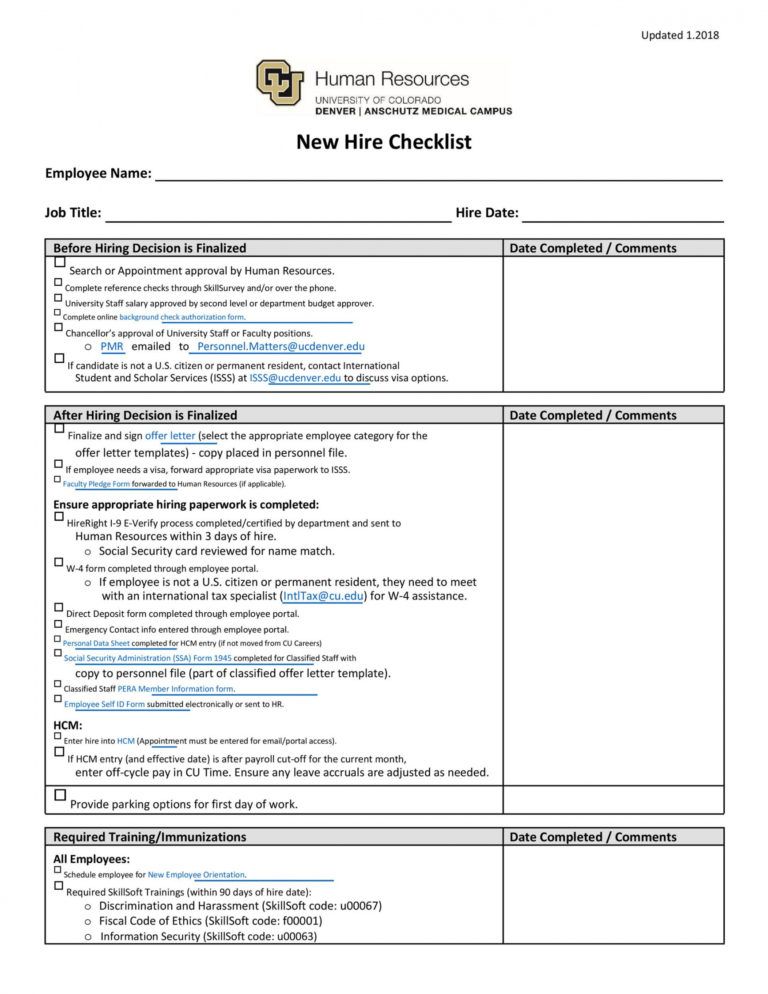New Hire Paperwork: When to Complete It?

The moment a new employee joins your organization, a myriad of tasks needs to be completed to officially onboard them. One critical aspect is the completion of new hire paperwork, which can often seem daunting for both the HR department and the new employee. Understanding when this paperwork should be completed can streamline the onboarding process, ensuring compliance with legal requirements and setting the stage for a smooth integration into the company culture. Let's delve into the optimal times for completing this crucial paperwork.
Pre-employment Paperwork

Even before an employee’s first day, there are documents that can be provided for review or completion:
- Offer Letter: An employee should sign and return this to confirm acceptance.
- Background Check Authorization: Necessary for legal compliance and often completed before the start date.
- Drug Testing Consent: If your company mandates drug testing, this document should be completed as soon as possible.
Note

💡 Note: Certain documents, like the I-9 form for employment eligibility verification in the U.S., can be started pre-hire but must be completed post-hire to be legally compliant.
First Day Paperwork

The first day is crucial for making a good impression and setting expectations. Here’s what typically happens:
- Employee Handbook: Employees review and acknowledge company policies and procedures.
- I-9 Form: The employee needs to complete Section 1 and provide required identity documents.
- Direct Deposit Authorization: This ensures employees receive their pay efficiently.
- Confidentiality Agreement: Signing this often happens on the first day to protect company secrets from day one.
It’s important to manage these documents efficiently as first impressions are formed on this day.
Within the First Week

Although much paperwork is done on the first day, some forms benefit from a little more time:
- W-4 Form: An employee can take a few days to understand their tax situation before filling this out.
- Health Insurance Enrollment: This might require reviewing different plans and consulting family members.
- Retirement Plan Enrollment: Selecting a retirement plan is important, and an employee may need some time to make this decision.
- Emergency Contact Information: Employees should have ample time to provide accurate information.
A dedicated HR session during this week helps new hires understand their benefits thoroughly.
Note

📅 Note: It’s advisable to provide deadlines for forms that need to be completed within the first week to ensure timely processing.
Within the First Month

Some paperwork might be more suitable for employees to complete over a longer period:
- Performance Goals and Objectives: Setting these within the first month helps align employee expectations.
- Onboarding Surveys or Feedback Forms: Giving employees a few weeks allows for better reflection on their onboarding experience.
Having this paperwork completed within the first month allows time for review and adjustment if necessary.
Benefits of Timely Paperwork Completion

Completing paperwork in a timely manner has several advantages:
- Legal Compliance: Ensuring all documents are correctly filled out helps maintain legal standards.
- Payroll Accuracy: Timely payroll paperwork avoids issues with payment schedules.
- Employee Satisfaction: Efficient onboarding and paperwork completion leads to a positive first experience.
- Streamlined Onboarding: A clear process for paperwork helps streamline the onboarding process.
Note

👤 Note: Not completing required paperwork promptly can result in delayed benefits, payment issues, or compliance penalties.
The integration of new hires into your organization is not just about filling out forms; it's about setting them up for success. By understanding when to complete new hire paperwork, you can ensure legal compliance, improve employee satisfaction, and lay the foundation for a positive relationship. Tailoring the paperwork process to the employee's timeline, while still maintaining efficiency, can significantly impact the new employee's perception of the company. A well-organized approach to paperwork completion can be the first step towards building a productive and engaged workforce.
Why is it important to complete new hire paperwork on time?

+
Completing paperwork on time ensures legal compliance, avoids delays in payroll and benefits, and contributes to a positive onboarding experience.
What should be done if an employee misses a paperwork deadline?

+
If deadlines are missed, HR should communicate the importance of the paperwork, provide reminders, and offer assistance to complete the forms promptly.
How can new hires be encouraged to complete their paperwork efficiently?

+
Clear communication, setting expectations, providing deadlines, and offering support like HR sessions or digital tools can make the process more efficient.
Is it okay to give new hires some time before completing certain forms?

+
Yes, especially for forms that require understanding or personal decisions like W-4 or benefits enrollment. However, ensure there’s a clear timeframe for completion.
What forms are critical to have completed on the first day?

+
Forms like the I-9, Employee Handbook acknowledgment, direct deposit authorization, and confidentiality agreement are usually critical for the first day.



